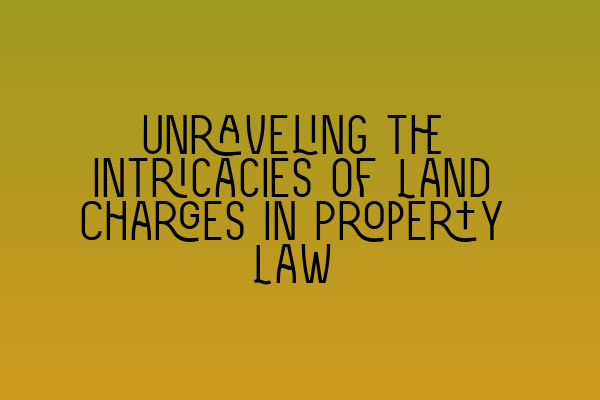Unraveling the Intricacies of Land Charges in Property Law
Welcome to SQE Property Law & Land Law! As solicitors specializing in property law, we understand the intricacies and complexities that come with dealing with land charges. In this blog post, we will unravel the mysteries surrounding land charges and provide you with a comprehensive guide to understanding their significance in property law.
Land charges play a crucial role in property transactions, as they help safeguard the interests of both buyers and lenders. But what exactly are land charges? In simple terms, land charges are any interests or rights that are registered against a property and are binding on subsequent owners or occupants.
A wide range of charges can be registered against a property, and the Land Charges Act 1972 outlines the types of charges that can be registered. These include charges such as mortgages, easements, restrictive covenants, and equitable interests. Each of these charges has its own legal implications and can affect the ownership and use of a property.
Mortgages are perhaps the most common type of land charge. A mortgage is a loan secured against a property, and the lender has a legal right to repossess the property if the borrower fails to repay the loan. Understanding the terms and conditions of mortgages is essential for both buyers and lenders, and it is crucial to seek legal advice before entering into any mortgage agreement.
Easements are another important type of land charge. An easement is a right that one party has to use the land of another party for a specific purpose. Examples of easements include rights of way, rights to light, and rights to drainage. Easements can significantly impact the use and value of a property, and it is important to ascertain whether any easements exist before purchasing a property.
Restrictive covenants are also common land charges. These are agreements or obligations that restrict the use or development of a property. For example, a developer may be prohibited from building certain structures on a property or using it for specific purposes. Restrictive covenants are typically registered against the title of a property and can have a significant impact on its future use and value.
Equitable interests are another type of land charge that can be registered against a property. Equitable interests are non-legal interests in a property, and they arise from agreements or arrangements that are not enforceable in court. Understanding equitable interests is important, as they can affect the ownership and transferability of a property.
When dealing with land charges, it is essential to conduct thorough research and due diligence. This includes conducting searches with the Land Registry and other relevant authorities to establish whether any land charges exist and determining their implications. Seeking legal advice is crucial to ensuring that you are fully aware of the land charges affecting a property before entering into any transactions.
At SQE Property Law & Land Law, our team of expert solicitors can assist you with all aspects of property law, including land charges. We have extensive knowledge and experience in dealing with land charges and can guide you through the process, ensuring that you are fully informed and protected.
In conclusion, land charges are an integral part of property law, and understanding their intricacies is crucial for both buyers and lenders. By gaining a thorough understanding of the various types of land charges and their implications, you can navigate property transactions with confidence and peace of mind.
If you would like further guidance on land charges or any other property law matters, please do not hesitate to contact us at SQE Property Law & Land Law. Our team of expert solicitors is here to assist you every step of the way.
Related Articles:
– SQE 1 Practice Exam Questions
– SQE 1 Practice Mocks FLK1 FLK2
– SQE 2 Preparation Courses
– SQE 1 Preparation Courses
– SRA SQE Exam Dates
